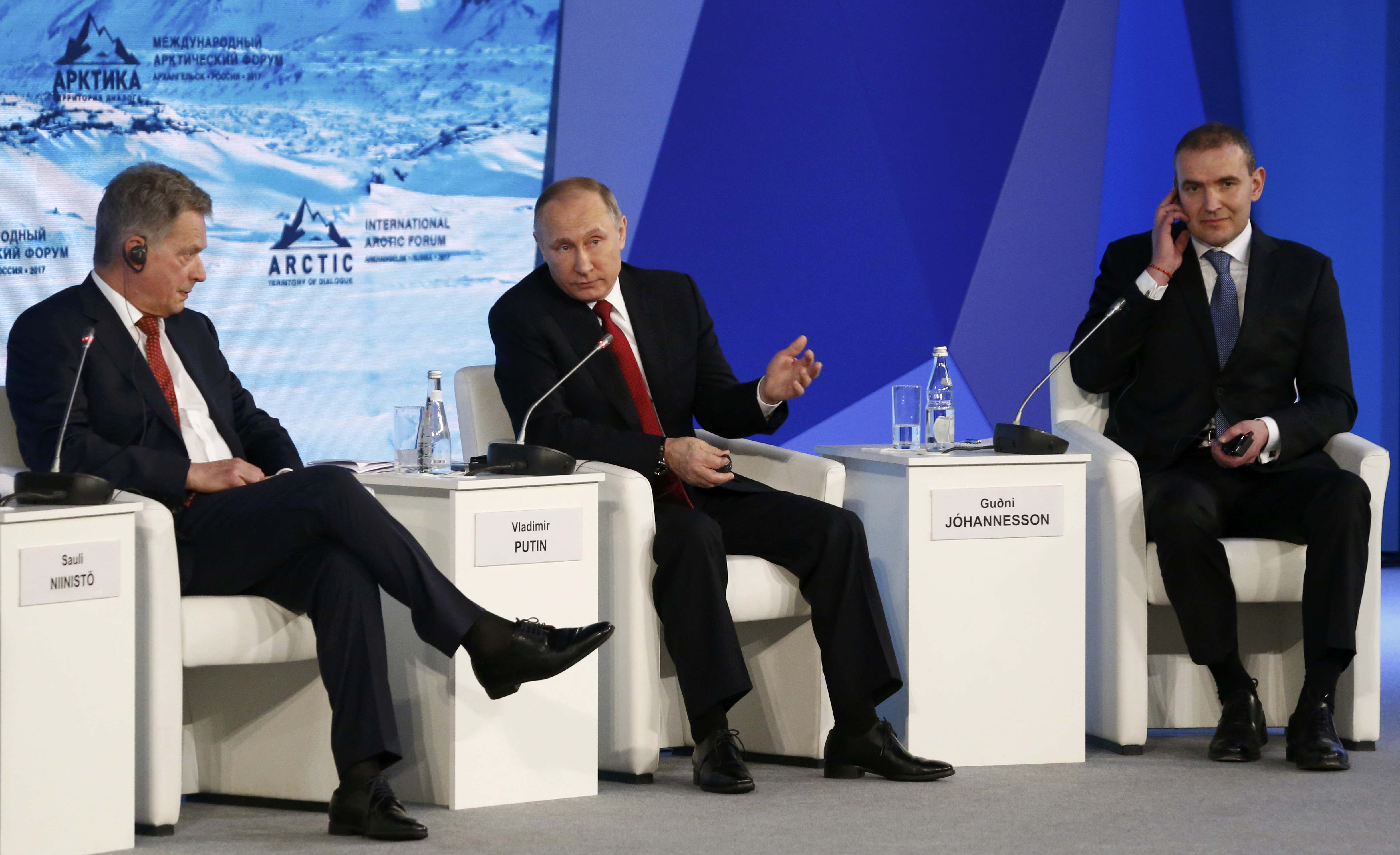The Arctic remains a bright point in the sometimes bumpy relations between Russia and the Nordic states

Not since Russia’s annexation of Crimea in 2014 have we seen something like this: the foreign ministers of Norway, Denmark and Iceland speaking of peace and cooperation while visiting Russia. And Sweden’s foreign minister only missing because of illness.
Since Crimea and Russia’s involvement in the unrest in eastern Ukraine, the Nordic countries have been staunch supporters of sanctions against Russia.
These countries say they stand strongly behind the West’s pressure on Russia. However, the foreign ministers clearly demonstrated just how keen they are to keep diplomatic channels wide open. They were given a convenient venue to do so on Wednesday, in Arkhangelsk, in northwestern Russia, during the opening day of Arctic: Territory of Dialogue, a major Russian conference on Arctic development.
The conference has attracted around 1,500 officials, mainly Russian, and business leaders to Lomonosov University. It is situated in Arkhangelsk on the White Sea, a southern inlet of the Barents Sea, located on the north-western coast of Russia.
Diplomats at the conference confirmed that the Nordic countries had consulted each other before attending, but they did not consider their presence a joint operation.
“Denmark has a two-pronged approach, where we remain hard and unwavering on issues like Crimea, where Russia is clearly breaking the rules, while on other issues we continue our dialogue,” Anders Samuelsen, the Danish foreign minister, and the first member of the Danish government to visit Russia since 2014, said on the plane from Copenhagen.
“The Arctic is very important to Russia and we agree very much that the Arctic should be maintained as a region of low tension and cooperation.”
On Wednesday, the Nordic foreign ministers dined with Sergei Lavrov, their Russian counterpart.
Vladimir Putin addressed the conference Thursday, as did the presidents of Finland and Iceland.
During his address on Wednesday, Børge Brende, the Norwegian foreign minister, stressed how the Arctic countries, including Russia, have found “remarkable ways to work together”. He reminded the audience how Norway and Russia have successfully and jointly managed fish stocks in the Barents Sea for decades.
Arctic development and peace is a top priority in Oslo. Norway shares an Arctic border with Russia’s heavily militarised Kola Peninsula, and the relationship has been increasingly bumpy for some time. But Brende stressed how the two countries shared an interest in safeguarding peace and sustainability in the Arctic.
Sauli Niinitsö, the Finnish president, who met with Mr Putin last year, addressed the conference on Thursday. Before travelling, Niinitsö told the media how the changing climate in the Arctic provides common ground with Russia.
“This global phenomenon has been confirmed by science, but its influence is most acutely felt in the Arctic right now,” TASS, a Russian news outlet, quoted him as saying. “It is important for us to take this problem seriously and work together to solve it.”
The need for deft diplomatic balancing in Arkhangelsk was evident from the very beginning.
Dmitry Rogozin, Russia’s deputy prime minister, the official host of the conference, spoke just before the Nordic dignitaries. He is the chairman of Russia’s Arctic Commission, a body overseeing development in the country’s vast Arctic regions.
In 2014, the EU and the US added Rogozin to their lists of officials banned from travelling to the West and from using Western banks. They cited his support of Russia’s annexation of Crimea, but, at the meeting in Arkhangelsk, the dialogue seemed untroubled.
The need for Arctic cooperation seems to iron out such hurdles — as long as the talk remains on Arctic issues. The Nordic countries already cooperate closely with Russia in the Arctic Council.
Denmark, with its sovereignty over Greenland, is keen to preserve the Arctic as a “zone of low tension.”
Denmark and Russia claim large and overlapping tracts of ocean floor in the Arctic Ocean. Meanwhile, Iceland, a booming tourism and transport hub in the North Atlantic, wants to develop its marine resources in the waters that are also exploited by Russia.
Additionally, Iceland sees increased Arctic shipping through the Northern Sea Route, along Russia’s northern coast, as a potentially strong source of income.
At the same time, half of the four million people living in the Arctic are Russians, and Russia would deeply like to develop its Arctic resources: oil, gas, minerals, fish and the Northern Sea Route, which would link Europe and Asia.
Diplomats at the conference said Russia’s Nord Stream 2 project, which would lay down new gas pipelines to the EU, cutting through Danish and Swedish waters, had not been on the agenda, even if the project remained a major headache in both of the Nordic countries.
Copenhagen and Stockholm are reluctant to facilitate a major increase in Russian gas exports to the EU, in the assumption that this would be used for political gains by Russia. After initially finding little common ground or support on the issue in the EU, Brussels, the Danish media reports today, that it would negotiate on behalf of member countries.
The Martin Breum is a Danish journalist who has written extensively about Arctic issues, including most recently The Greenland Dilemma.